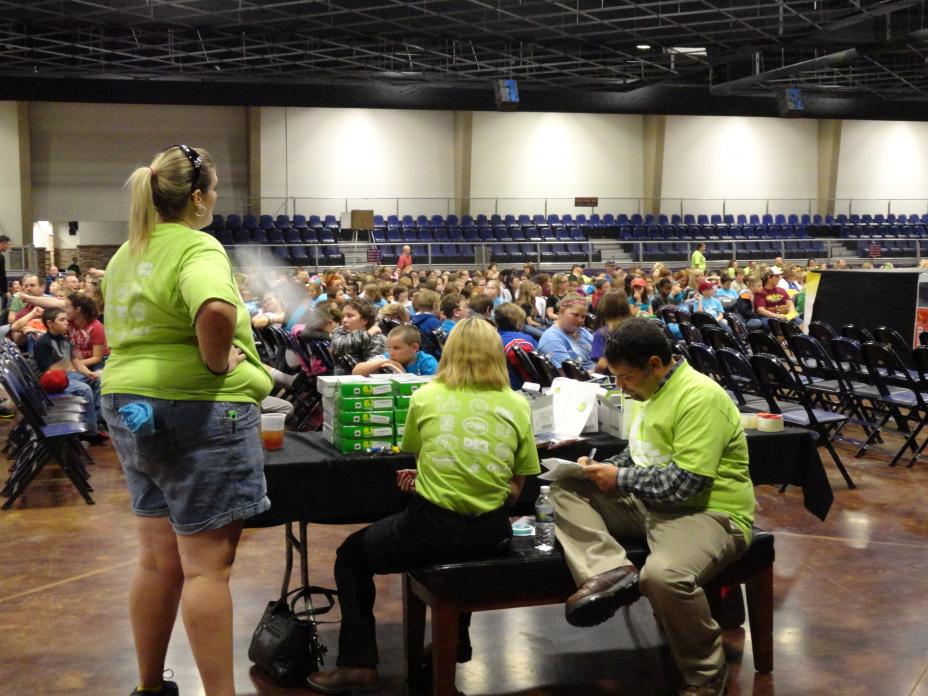Choctaw Healthy Energy Living Project
Learn about other climate showcase communities.
Durant, Oklahoma
Federal Funding: $189,817
Project Timeline: February 2011 – April 2013
- Project Summary
- Community Characteristics
- Results
- Lessons Learned
- Sustainability/ Replication
- Project Website
- Photos
The Choctaw Healthy Energy Living Project (Project HELP) promoted energy efficiency improvements and education throughout the Choctaw Nation Indian Hospital System. The community depends heavily on the hospital system—it is the sole source of in-patient, emergency, substance abuse and diabetic care within 25 miles. Five facilities within the system received lighting retrofits because of this project. Staff and facility patients participated in a comprehensive educational program intended to encourage sustainable energy habits.
Project HELP replaced existing hospital light fixtures with efficient fixtures that provide the lighting levels needed for effective care. The retrofits were coupled with an intensive employee and patient education program, including a brochure and six training sessions. As they oversaw the work, Project HELP coordinators identified barriers and best practices. These observations were compiled into a white paper and a DVD that served as a guide for hospitals undertaking similar projects.
The five facilities that received retrofits were the Choctaw Nation Indian Hospital, the Recovery Center, the Chi Hullo Li long-term residential substance abuse treatment center, the Diabetes Wellness Center, and the outpatient Rubin White Health Clinic. While these retrofits were projected to save almost 341,000 kilowatt-hours of electricity and prevent 213 metric tons carbon dioxide equivalent (CO2e) of greenhouse gas (GHG) emissions, they ultimately saved 396,000 kilowatt-hours (396 megawatt-hours) of electricity and prevented 273 metric tons CO2e emissions, while also promoting healthy living and sustainable energy habits. Hospitals have reduced electricity consumption that has resulted in savings of $21,705 annually.
Project staff completed filming for the documentary DVD highlighting the success of the project, and distributed the DVD and white paper on Project HELP to 127 hospitals of similar size in Oklahoma. They completed two public service announcements, one on water conservation and another on energy efficiency, that have been airing on TV since early June 2012. They also conducted trainings on lighting retrofits at the Talihina hospital and for management staff at all outlying clinics, with light bulbs distributed to all participants. Additionally, the “Earth Day is Every Day” event was held for nearly 600 4th, 5th, and 6th grade students. Finally, the Choctaw National purchased programmable thermostats and induction parking lot lights with photocells to help further reduce energy use and GHG emissions.
Population: 80,000
Area: 11,229 square miles
Government Type: Tribal
Community Type: Rural
Median household income: $34,008
|
Final Results |
Projected Cumulative Results |
|
|---|---|---|
|
Annual GHG Reductions |
277.7 mt CO2e |
213 mt CO2e |
|
Annual Electricity Reductions |
396 MWh |
341 MWh |
- Working with the community through additional training and media presence contributes significantly to the success of project goals.
- Project coordinators distributed a White Paper detailing the process and success of Project HELP to other small, rural, and tribal hospitals to encourage project replication and share best practices for hospital energy efficiency and GHG emission reduction projects.
- Although the program has ended, the energy-efficiency strategies that participants learned will continue to be beneficial.
Choctaw Nation Going Green Facebook page Exit
 The Project staff held an “Earth Day is Every Day” event for students and teachers.
The Project staff held an “Earth Day is Every Day” event for students and teachers.
